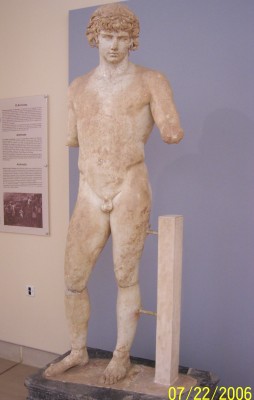|
The content on this website is
maintained by Robert
Myallis, pastor at Zion's
Lutheran Church, of Jonestown, PA.
The photos were taken by Emily
Myallis, a diaconal minister in the ELCA who also serves at
Zion's Lutheran.
This website and travel to
Greece was made possible by a grant from the
Fund for Theological Education,
which provides grants to assist the education and formation of
Christian leaders from numerous denominations.
Bible quotes are taken from the New
Revised Standard Version, unless cites otherwise.
The above photo of Greece comes from
NASA; The icon of Saint Paul comes from George Mitrevski's website. |
 |
|
Antinoos
Statue
 The picture here of Antinoos, the lover of the Roman Emperor
Hadrian, who lived in the 2nd century AD. Antinoos died at a
young age and the grieving Emperor made statues of him all over
and even wanted him worshipped. The emperor considered him the
paragon of beauty. The picture here of Antinoos, the lover of the Roman Emperor
Hadrian, who lived in the 2nd century AD. Antinoos died at a
young age and the grieving Emperor made statues of him all over
and even wanted him worshipped. The emperor considered him the
paragon of beauty.
How is this Antinoos statue significant for understanding the world of Paul?
Beauty had long been the thing in ancient Greece. To be divine meant to
be beautiful. As
Isocates (4th century BC) wrote, "beauty most respected,
most desirable, most divine of all values." People
expected the gods to be beautiful; it comes as little surprise
that Hadrian wanted his beauty prince worshipped for such beauty
was seen as divine.
 How is Paul confronting his culture?
How is Paul confronting his culture?
Instead of arguing that Jesus was beautiful, Paul presents
Jesus as crucified. Furthermore, instead of indicating that
beauty is any sort of standard by which God judges people, Paul
reminds the Corinthians:
Consider your own call, brothers and sisters: not many of you
were wise by human standards, not many were powerful, not many
were of noble birth. (First letter to the Corinthians, chapter
1:26) .
Surely the cult of beauty would be insulted by the words of
Jesus:
Blessed are the poor in spirit, for theirs is the kingdom of
heaven.
Blessed are those who mourn, for they will be comforted.
Blessed are the meek, for they will inherit the earth.
Blessed are those who hunger and thirst for righteousness,
for they will be filled.
Blessed are the merciful, for they will be shown mercy.
Blessed are the pure in heart, for they will see God.
Blessed are the peacemakers, for they will be called sons of
God.
Blessed are those who are persecuted because of
righteousness, for theirs is the kingdom of heaven.
Blessed are you when people insult you, persecute you and
falsely say all kinds of evil against you because of me. (Gospel
of Matthew, chapter 5:3-11)
sources:
info and statue: Delphi Museum, July 2006.
info on beauty and
Isocrates quote: Vrissimtzis, Nikolaos.
Love, Sex and Marriage in Ancient Greece. Greece, 1997.
|
|



 The picture here of Antinoos, the lover of the Roman Emperor
Hadrian, who lived in the 2nd century AD. Antinoos died at a
young age and the grieving Emperor made statues of him all over
and even wanted him worshipped. The emperor considered him the
paragon of beauty.
The picture here of Antinoos, the lover of the Roman Emperor
Hadrian, who lived in the 2nd century AD. Antinoos died at a
young age and the grieving Emperor made statues of him all over
and even wanted him worshipped. The emperor considered him the
paragon of beauty.